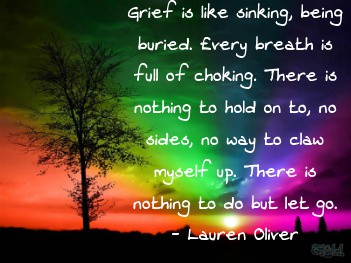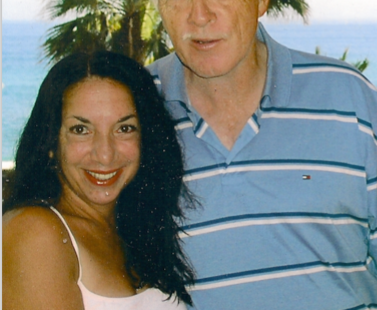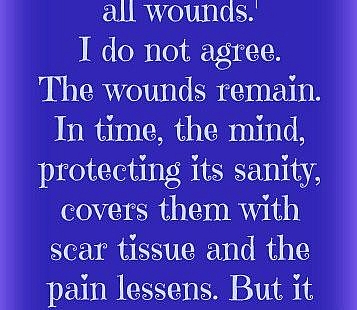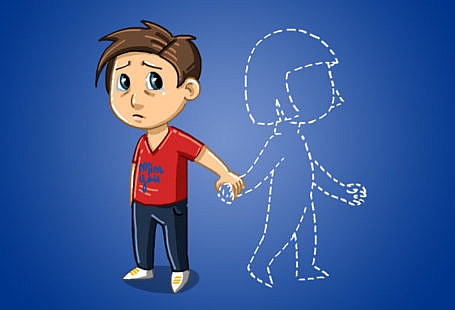You may still be in shock, and barely able to accept that you are a widow. These tips for dealing with the grieving process after your husband dies are from a widow. Her name is Kathleen, and she lost her husband after a long battle with Parkinson’s disease.

Healing After Loss: Daily Meditations For Working Through Grief by Martha Whitmore Hickman. Here’s what one person said about this book: Healing After Loss has incredibly insight, hope, understanding and some new ideas delivered in small doses. Since concentration levels are so affected during the grieving process, the one page entries are easy to read or skip, if you need a one that will more fit your moment.
In this article about the grieving process, Kathleen describes the pain she felt after her husband died, and then offers tips widowers and widows who are grieving loss. She’s a writer who has found ways to remain strong and happy, despite her grief that she lost her husband.
I hope her story and tips can help you through the grieving process, at least by showing you that you’re not alone. When you’re mourning, remember Moliere’s words: “If you suppress grief too much, it can well redouble.” Accepting – and maybe even embracing – loss may be one of the healthiest ways to cope with death. This means feeling your pain, sharing it with others, and finding the best ways for you to heal.
The Grieving Process After Your Husband Dies
Guest Post ~ Kathleen Airdrie
There’s no “normal” response to death. Everybody is different, which means you’ll grieve differently than a family member or coworker. Accepting yourself and others’ response to death is an important part of the grieving process. These tips for grieving widows or widowers can help you accept other people’s ways of mourning, and identify your own “best ways” to grieve.
Join a grief support group. Being with people who have experienced similar losses can help you cope with your grief. Just knowing you’re not alone can be reassuring; spending time with people who care helps you deal with your painful feelings. If you don’t find the bereavement group to be supportive, don’t be afraid to try a different one. And, joining a grief support group when you lose your husband will show you how others cope with loss — which will help with your own mourning process.
Here’s how a young widow dealt with the grieving process after her husband died: A Different Kind of Support Group for Widows.
Learn how “cybergrieving” works. Many people are now using sites like MySpace and their own personal blogs to deal with their feelings about the death of a loved one. To deal with grief, visit the blog or website of your loved one and write to them on it. You can write poetry, letters, songs, or even a one-liner, simply stating how you feel and what you think. This tip for grieving widowers or widowers involves finding different or unusual ways to let go of someone you love.
Let go of the past slowly. Feeling your grief, anger, guilt, and all your emotions is important. Let yourself grieve. You may feel like your heart will break or you’ll fall into a black pit and never get out – but you have to feel your feelings before you can heal. Letting go of the past through expression of your feelings is healthy way to grieve when you lose your husband.
If you’re dealing with the grieving process after your husband took his own life, read Coping With Life After Someone You Love Commits Suicide.
Remember that time heals – that old cliche! Time does heal when you’re grieving the death of your husband. Whether it completely heals ALL wounds is a different story, but it does dull the pain a little. Your feelings of loss and sadness may never go away, but with time your heavy burden of sadness will lighten. So will your grieving process.
Sharing your experience with grief and the grieving process is one of the best ways to heal. If you’d like to tell your story of how you lost your spouse, I welcome your comments below.
Kathleen’s Story of Her Husband’s Death
Guest Post ~ Kathleen Airdrie
My husband bravely, but with sadness, faced the truth of his fading good health and active life. He was a man who loved the outdoors, our canoe journeys on the rivers and lakes, and our gardens. A musician, he entertained at community events that included wedding receptions and charitable functions.
The diagnosis of Parkinson’s Disease was frightening because we knew that there was no cure. Throughout the following six years as his condition worsened we cried together often. Deprived of his balance, he couldn’t enjoy the canoe, and with the tremors increasing and his strength lessening, he could not play his fiddle. We faced it together, in our home, until pneumonia ended his life one cold February day.
After my husband died, a profound sense of loss overwhelmed me. Family members were helpful, but I had the terrible and terrifying feeling of being lost – away from myself. I could hear their voices, understand the actual words, but not really comprehend enough to participate in real conversations. My meals were merely snacks; enough to sustain me. Sleep was fitful. The loneliness and pervading sense of loss weighed heavily on me.

“The Grieving Process After Your Husband Dies” image by Laurie
A sign of healing was when a wonderful friend who was supportive during my darkest days of the grieving process shared my first ‘breakthrough’ moment with me. About three months after my husband’s death I told her that a family member reacted angrily to my response that I was just sort of coping. Raising her voice, she told me to ‘get over it’. I told my friend about how that remark made me sad, but mostly angry, then suddenly realized that the spark of anger was something I’d not felt since my husband’s death. We saw that as a hopeful sign.
My grieving process shifted while giving all of my attention and energies to the gardens that summer, I gradually regained my physical and emotional strengths. I began to eat better meals and sleep through most nights. Sometimes I sat in the garden and cried then continued the work with my renewed sense of purpose. While walking through my gardens a friend commented, “I know how difficult this year has been for you. Your garden is your victory.”
From that day I knew that I would be all right, or as all right as possible under the circumstances. No longer a recluse as I was during those awful months, I became involved in a few community activities again and travelled occasionally to visit family members. Most importantly, I was taking care of myself. Now, it’s not all sadness, it’s not all loneliness, it’s not all wonderful or humorous. It is a combination of all of those, as are most peoples’ lives.
“Grief is a most peculiar thing; we’re so helpless in the face of it. It’s like a window that will simply open of its own accord. The room grows cold, and we can do nothing but shiver. But it opens a little less each time, and a little less; and one day we wonder what has become of it.” – Arthur Golden, Memoirs of a Geisha.
Kathleen’s tips for the grieving process after your husband dies:
- Tell a family member or close friend what you need, whether it’s a good meal, a good listener or help with daily chores.
- Try to acknowledge the legitimacy of your feelings; be patient with yourself.
- While reminiscing with family members or friends, don’t let feelings of guilt intrude if you hear the sound of laughter from them or yourself.
Are you lonely because of your spouse’s death? Read Meeting New Friends – Help for Widows.
If you’d like to share your own story of loss and the grieving process, please comment below.





5 comments On The Grieving Process After Your Husband Dies
I lost my friend, husband and my girls’ daddy to a terrible vehicle accident a few weeks ago. I had just talked to him on the phone an hour and a half before the accident. I had no idea as I was picking up our first of three girls that he was being pronounced dead at that exact time. I picked up all three girls and brought them home from school. I went back to work for my last hour downtown. I received a call on my way home from the sheriffs office asking me to please come home. I was shaking, worried but not prepared. Within 5 minutes I was told that my husband had been in an accident… and died. I screamed at the top of my lungs! My girls came running out and screamed and cried! I screamed and fell to the ground. It was the worst, most unreal, unforgettable, disbelieving and gut wrenching feeling of my life. We were in total disbelief.
I am strong for my girls but just want to bawl so much of the time. I drive to work in a daze. I drive home in a daze. I can’t believe he is gone forever! My poor sweet girls. He loved them and me so very much. He ALWAYS told us. I am filled with such sadness. I feel like He has left to such a far and away place and has left me here all alone to care for our girls and myself. I thought he would just always be here no matter what. I just can’t believe he is gone. We want him back so very badly. My girls are 15, 13 and 9. We meant everything to him and he is supposed to still be here. I will be getting us all in counciling soon. I am so incredibly saddened!
Thank you for your sharing. I am very lost at present as I lost mu husband, and the love of my life only 25 days ago and due to us being expats it has taken me over 3 weeks to repatriate him and get him back to be layer to rest 2 days ago. THen it was Christmas today.
My family have flown over and are here but it is all too much. I just miss him dreadfully and am terrified , absolutely terrified of any life without him. All our plans and dreams are gone. He was only young and I cannot see 5 minutes ion the future. There is still so much to be dealt with before normality resumes but I don’t know if I can even do that.
I am so sad without him and yet I don’t feel a thing at the same time and although this is the longest we have been apart, I cannot believe it is real. Some of my family have been selfish and garnered their own sympathy from anyone they can while not sharing it with me. I am disgusted by some people behaviour and the requests I have had to accommodate. He would never allow me to be treated like that. terrified, lonely, and due to location etc. will not be able t join any groups etc.
Hope you can let me know if there is one on line i can participate in. can’t see the future without my love.
I lost my husband on 23rd dec 2013 from lung cancer. The diagnosis just 4 months ago and just 1 chemo and then he died. We had a turbulent last 3 years together as he drank but I feel guilty that I could have helped him more. I live in spain, so much of my support is in the uk. I feel lonely and put on a brave face in the daytime, but cry at night. I need to get on with my life but feel that at 70, it will be hard.
My husband of 22 years passed away on Jan 29, 2014, after a two and a half year victory over pancreatic cancer. I can’t believe I am a widow. I’m fearful of being alone. I feel guilty that I miss the days when he was sick. They were peaceful days and we were together. I had a sense of purpose.
My husband died unexpectedly at home in January. For the longest time, all I felt was numbness. I can only describe the process as a gradual thawing of my emotions, I suppose as I am prepared to deal with them. I have made an effort to move forward one step at a time and stay busy. Although I work and have my moments of fun, I also have my moments of grief and process in private. I don’t feel comfortable providing open access to my every emotion.
I am having the hardest time dealing with those who feel compelled to comment on how well I’m coping. Sometimes I get the feeling they are disappointed that I’m not providing some huge display of grief. I try to believe that they mean well, but sometimes I’m not so sure.